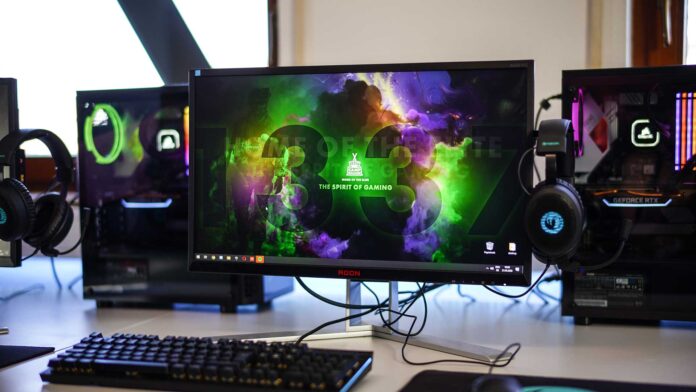IPS, or “In-Plane Switching” monitor, is widely used in LCD screen technology. IPS switches the orientation of the molecules in LCD by orderly laying them out parallel in between the glass substrate of the screen. Besides IPS, other panel technologies exist in the market, for instance, Super Plane to Line Switching (PLS), Vertical Alignment (VA) panel, Twisted Nematic (TN) panel. When selecting any of these, take into account their intended roles, and your individual preferences. Office Consumer offers monitors for different sectors such as gamers and graphic designers.
Origin Of IPS
These monitors were designed to overcome the drawbacks of TN matrix LCDs. Twisted Nematic(TN) has been the conventional type of panels for years. These have inferior color production and limited viewing angle in comparison to IPSs. This simply means a color variation is noticed when the TN is viewed from a different gradient point. Unlike in TNs, the color contrast remains unchanged in IPSs, irrespective of the viewing angle.
Uses Of IPS
In-plane switching technology is widely used in touch-screen devices such as laptops and smartphones, and PC screens. It is famous for color and hue accuracy, grayscale presentation, wide off-center viewing angles, and efficiency. As a result, the display looks terrific from any angle, and there is no loss of colors.
Some Great Available IPS Monitors In The Market Are
LG 27GL650F-B 27″ FULL HD 1MS 144HZ IPS GAMING Monitor: It is for fast-paced games. It virtually eliminates screen tearing and fluttering.
LG 24MK600M 24″ 5MS VGA HDMI IPS LED Monitor: The sleek bezel side offers a practical borderless visual experience with brilliant picture quality.
PHILIPS 273V7QDAB/00 27″ IPS FULL HD Monitor: It has enhanced Full HD 1920 x 1080 resolution. It also shows detailed pictures featured with high brightness, excellent contrast, and natural colors.
Benefits Of IPS
- Reaction Time
IPS has stable response times ranging from 5 to 8 milliseconds. For IPS monitors, the time reaction varies from brand to brand. TN is superior to IPS in this aspect as they generally have fast response times ranging from one millisecond to less than five milliseconds which makes them perfect for playing competitive games.
However, the latest IPS monitors have been upgraded with regards to response time and are now as reactive as TN across the board.
However, you can disregard this attribute unless you are buying it for an incredible gaming experience.
- They Are Professional
Because they are an innovative product, IPSs monitors can be a pricey option for some. If you are confused about purchasing only one out of the plenty panel choices available in the market, you should base your decision on your needs. IPSs is quite an extravagant product for average office consumers because most of them do not need its distinctive features for their daily tasks. Ordinary PC monitors or VA will do the job just fine.
However, IPS ought to be the option for professionals like digital designers and CAD engineers. Digital artistry and photo/video editing are among the professions that revolve largely around colors. They may have unmatched creative skills, and brilliant ideas, but if their monitors do not support professional color palettes, everything will be in vain. Their attempt to execute the ideas in their minds might go off the tangent in outcomes and fail to meet their expectations every time. This might eventually have an unfavorable impact on their work ethic.
Here, IPS plays the role of a savior because it is a good performer. It offers more displayable colors so that you can undertake the visual art work with a high degree of accuracy. It presents you with true-to-life pictures with respect to hue, chroma, and shades so you will not have to worry about biased outcomes.
The Downside Of Ips Monitors
- IPS monitors generally have a static contrast ratio below average.
- They deliver blur motion than a TN monitor.
Ultimately, the budget and feature preferences will define the best fit for each user. Additionally, quality may differ among manufacturers due to choice of display’s components, construction, and design. An IPS monitor is the finest choice for technology enthusiasts, gamers, and color-dependent professionals like photo or video editors.

































